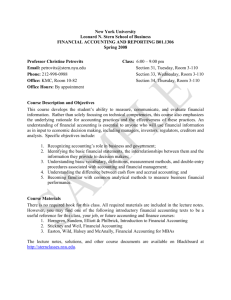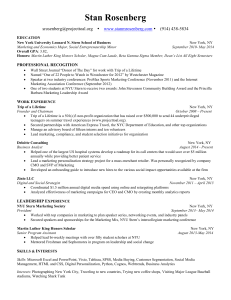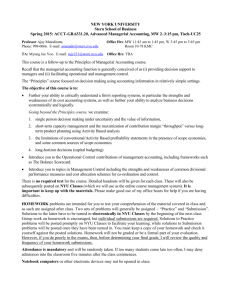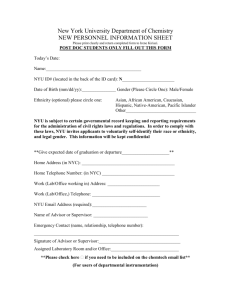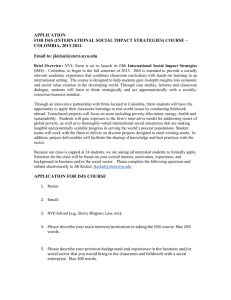Risk Management In Financial Institutions
advertisement
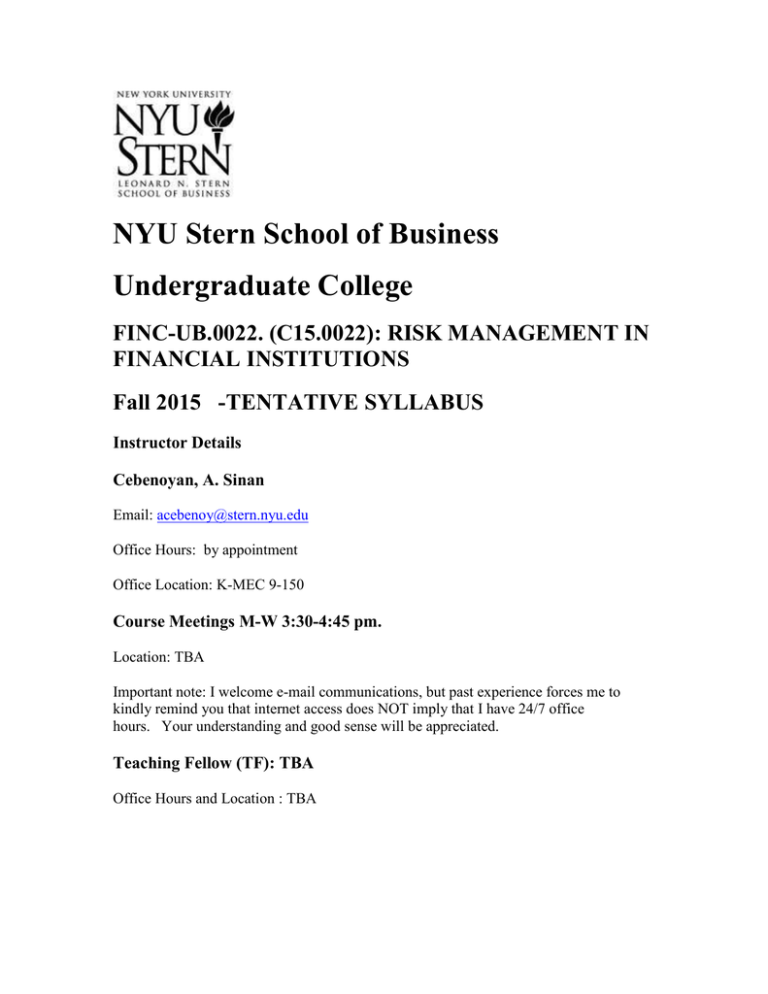
NYU Stern School of Business Undergraduate College FINC-UB.0022. (C15.0022): RISK MANAGEMENT IN FINANCIAL INSTITUTIONS Fall 2015 -TENTATIVE SYLLABUS Instructor Details Cebenoyan, A. Sinan Email: acebenoy@stern.nyu.edu Office Hours: by appointment Office Location: K-MEC 9-150 Course Meetings M-W 3:30-4:45 pm. Location: TBA Important note: I welcome e-mail communications, but past experience forces me to kindly remind you that internet access does NOT imply that I have 24/7 office hours. Your understanding and good sense will be appreciated. Teaching Fellow (TF): TBA Office Hours and Location : TBA Course Description and Learning Goals This course will focus on the financial management and regulation of financial institutions, with a primary focus on commercial banks. Students should be able to comprehend the various forms of risks faced by intermediaries and the trade-offs required in order to balance risks and returns. The focus will be on the modern techniques of asset, liability and risk management, with an emphasis on the regulatory issues of capital adequacy, and risk-shifting as they affect the safety and soundness of the financial system. By the end of this term you are expected to be fluent in all major sources and kinds of risks faced by larger financial institutions. Course Pre-Requisite C15.0001 Course Outline: Not All sections of all chapters will be required. Sections to be omitted will be announced in class. Your dedicated attendance will save you time and headaches. The chapters that are in bold (and shaded) will be the ones that have the highest chance of coverage. Other chapters may be covered as time permits. Also, regularly check the NYU Classes site for changes and announcements. IMPORTANT NOTICE: This is NOT a Web-based course. The course is centered around what I teach in class, and NOT on what is posted on the web. All information posted on NYU Classes and elsewhere on the web is meant to supplement and NOT substitute the teaching that goes on in the classroom. If you do NOT attend class and expect to succeed in the course just by following what is on the web, you will be disappointed. Part I: Overview Chapters 1.Introduction 2.Why are Financial Intermediaries Special? 3. The regulators 4. Financial Services Industry Securities firms, Insurance) 1 (Commercial banks, thrifts, Finance companies, 2-6 Part II: Risks of Financial Institutions 1. Overview of Risks 7 2. Interest rate risk (funding gaps, maturity gaps, duration and convexity analysis) 8,9 (parts of the appendix) 3. Credit Risk 10,11 4.Sovereign Risk 14 5. Liquidity Risk 12 6. Market Risk Simulation) (JPM’s Risk Metrics, Back 7. Futures and forwards 15 22 Part III: Managing Risks – Regulations- Innovations 1. Capital Adequacy (Basel Accords, Issues, Implications and applications) 2. Securitization (Pass Throughs, CMO’s, MBB’s, strips) - 20 26 3. Swap example Required Course Materials Text: Required: Anthony Saunders, Marcia Cornett, Financial Institutions Management: A Risk Management Approach, 8th edition, McGrawHill-Irwin, 2014. You are expected to own and be able to use a financial calculator (e.g. HP 10BII). You are also expected to follow financial media, and come to class fully aware of what is going on in the financial markets. Assessment Components Grading: You will have THREE exams including a cumulative final. The first exam is scheduled on date TBA, the second exam on date TBA. The final dates and times are set by NYU. You will also be asked to research a bank of your choice over time and against its peers on issues discussed in this course. This will be submitted as a term paper (details to follow below) by date TBA on NYU Classes through Turnitin by 11:55 pm. Late submissions will go down a full letter grade per day. I also reserve the right to give a couple of unannounced quizzes. Your final exam will be cumulative. Make-ups are not possible for these exams/assignments/papers/quizzes. Attendance will be taken frequently, if not always. All exams are closed-book, and closed-notes. I will provide a uniform formula sheet (a similar one will be posted on NYU Classes). No electronic devices other than approved calculators are allowed in exams. Attempts at considering a less-than-honest effort will not be tolerated. The first two exams will be worth about 20-25 points each, the paper/project will be 15 points, Class participation, attendance, and occasional assignments may be worth 5-10 % of your overall grade, and the final will make up the difference to add up to 100. There are no additional works that you may ask to do if you do not like your grade. Once your grade has been submitted by me to the university, there is nothing left to do for you or me in this course. There are no exceptions to these rules. TERM PAPER/PROJECT INSTRUCTIONS. Absolutely before the first exam date, you are to choose a medium to large sized AMERICAN (as in headquartered and chartered in the USA) Commercial bank, and study its performance over time and with respect to its peers (Time-series and crosssection) with special emphasis given to issues analyzed in this course.(Google ‘Large US commercial banks’, go to http://www.federalreserve.gov/releases/lbr/current/default.htm choose a bank in the top to middle range). You are expected to gather AND analyze financial data relevant for such analysis from both the web (FDIC is a good source, start at http://www2.fdic.gov/sdi/main.asp ) and the NYU library resources. You must notify me and the TF by the date of the first exam in writing as to which bank you wish to work on, and get my approval. This date would put you in a late start. SO, start NOW! I also want you to send the TF your raw data as Excel spreadsheets by date TBA. This is mandatory. If no data or late data by this date, you go down by one grade level. EXPECTATIONS: The list below contains activities that not all banks may engage in. If your bank does not have significant activity or does not provide sufficient data to analyze, just state the fact and move on. Do NOT waste space by defining ratios/tools etc. Do the best job you can, as you will be compared to your peers. Students in prior years have used their projects as part of their portfolio in their job searches. Study your bank for at least 5 periods (years, quarters) with an eye towards: Interest rate risk exposures (maturity mismatches at the least) Market Risk Exposures (trading assets at the least) Credit Risk exposures (loan portfolios at the least, loan losses, non-performing loans, etc…) Liquidity Risk exposures Off balance sheet exposures Capital adequacy Profitability (ROA,ROE) Risk management (securitization, loan sales, derivatives, etc.) Sovereign risk exposures (LDC loans) Analyze your bank’s positions over the years, and also compare it to the national aggregates, and/or its peers. Use at least 2-3 peers. Where do you see your bank going? What are its prospects? You are welcomed to add other relevant sources of information to your analysis. YOU MUST PROVIDE LINKS AND BIBLIOGRAPHIES FOR ALL SOURCES YOU USE. Your report should NOT exceed 10 single-spaced (Times New Roman font 12pt size) pages, and is due (absolutely!) by 11:55pm, by date TBA. Please NO E-MAIL, NO FAX, NO EXCEPTIONS! You will submit your report through TURNITIN on NYU Classes. If the time stamp is later than the deadline you will automatically move one letter grade down for each day that the paper lags into. Grading At NYU Stern, we strive to create courses that challenge students intellectually and that meet the Stern standards of academic excellence. To ensure fairness and clarity of grading, the Stern faculty have agreed that for elective courses the individual instructor or department is responsible for determining reasonable grading guidelines. The Finance Department has elected to use the following grading guidelines for this course and all other elective courses. Instructors should award grades of “A” or “A-” to approximately 35% of students in elective courses with enrollments of more than 25 students. In elective classes of less than 25 students, the instructor is at liberty to give whatever grades they think the students deserve, while maintaining rigorous academic standards. Note that while the School uses these ranges as a guide, the actual distribution for this course and your own grade will depend upon how well you actually perform in this course. Re-Grading The process of assigning grades is intended to be one of unbiased evaluation. Students are encouraged to respect the integrity and authority of the professor’s grading system and are discouraged from pursuing arbitrary challenges to it. If you believe an inadvertent error has been made in the grading of an individual assignment or in assessing an overall course grade, a request to have the grade reevaluated may be submitted. You must submit such requests in writing to me within 7 days of receiving the grade, including a brief written statement of why you believe that an error in grading has been made. Professional Responsibilities For This Course Attendance Class attendance is essential to your success in this course and may be part of your grade. An excused absence can only be granted in cases of serious illness, grave family emergencies, or religious observance and must be documented. Job interviews and incompatible travel plans are considered unexcused absences. Where possible, please notify me in advance of an excused absence. Participation In-class contribution may contribute to part of your grade and an important part of our shared learning experience. Your active participation helps me to evaluate your overall performance. You can excel in this area if you come to class on time and contribute to the course by: Providing strong evidence of having thought through the material. Advancing the discussion by contributing insightful comments and questions. Listening attentively in class. Demonstrating interest in your peers' comments, questions, and presentations. Giving constructive feedback to your peers when appropriate. Assignments Late assignments will either not be accepted or will incur a grade penalty unless due to documented serious illness or family emergency. Exceptions to this policy for reasons of religious observance or civic obligation will only be made available when the assignment cannot reasonably be completed prior to the due date and you make arrangements for late submission in advance. Classroom Norms Arrive to class on time and stay to the end of the class period. Chronically arriving late or leaving class early is unprofessional and disruptive to the entire class. Repeated tardiness will have an impact on your grade. Turn off all electronic devices prior to the start of class. Laptops, cell phones and other electronic devices are a distraction to everyone. Stern Policies General Behavior The School expects that students will conduct themselves with respect and professionalism toward faculty, students, and others present in class and will follow the rules laid down by the instructor for classroom behavior. Students who fail to do so may be asked to leave the classroom. Collaboration on Graded Assignments Students may not work together on graded assignment unless the instructor gives express permission. Course Evaluations Course evaluations are important to us and to students who come after you. Please complete them thoughtfully. Academic Integrity Integrity is critical to the learning process and to all that we do here at NYU Stern. As members of our community, all students agree to abide by the NYU Stern Student Code of Conduct, which includes a commitment to: Exercise integrity in all aspects of one's academic work including, but not limited to, the preparation and completion of exams, papers and all other course requirements by not engaging in any method or means that provides an unfair advantage. Clearly acknowledge the work and efforts of others when submitting written work as one’s own. Ideas, data, direct quotations (which should be designated with quotation marks), paraphrasing, creative expression, or any other incorporation of the work of others should be fully referenced. Refrain from behaving in ways that knowingly support, assist, or in any way attempt to enable another person to engage in any violation of the Code of Conduct. Our support also includes reporting any observed violations of this Code of Conduct or other School and University policies that are deemed to adversely affect the NYU Stern community. The entire Stern Student Code of Conduct applies to all students enrolled in Stern courses and can be found here: Undergraduate College: http://www.stern.nyu.edu/uc/codeofconduct Graduate Programs: http://w4.stern.nyu.edu/studentactivities/involved.cfm?doc_id=102505 To help ensure the integrity of our learning community, prose assignments you submit to NYUClasses will be submitted to Turnitin. Turnitin will compare your submission to a database of prior submissions to Turnitin, current and archived Web pages, periodicals, journals, and publications. Additionally, your document will become part of the Turnitin database. Recording of Classes Your class may be recorded for educational purposes Students with Disabilities If you have a qualified disability and will require academic accommodation of any kind during this course, you must notify me at the beginning of the course and provide a letter from the Moses Center for Students with Disabilities (CSD, 998-4980, www.nyu.edu/csd) verifying your registration and outlining the accommodations they recommend. If you will need to take an exam at the CSD, you must submit a completed Exam Accommodations Form to them at least one week prior to the scheduled exam time to be guaranteed accommodation. CHANGES I reserve the right to change the above if needed. I will do so only if I have to.
